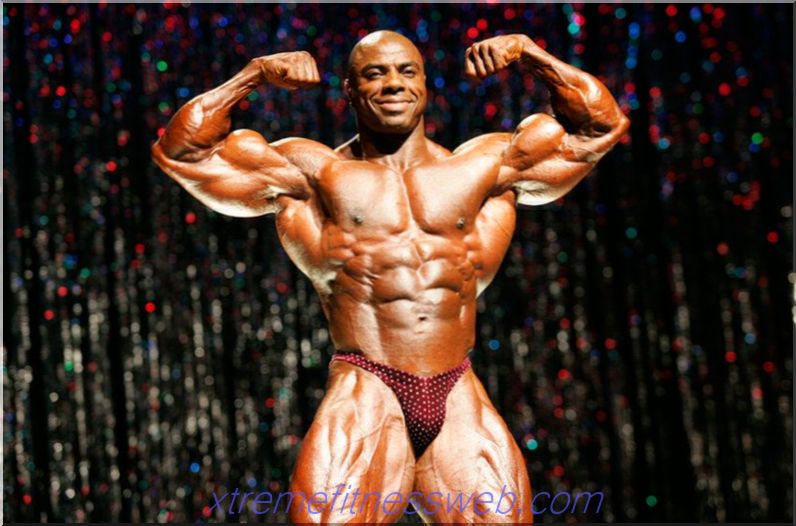- Anthropometric data
- Kevin Levron Biography
- Best career achievements
- Hand Training by Kevin Levron
- Shoulder training

Content
- 1 Anthropometric data
- 2 Biography of Kevin Levron
- 3 Best Career Achievements
- 4 Hand Training by Kevin Levron
- 5 Shoulder Workout
Anthropometric data
- Height: 176 cm
- Weight: 127 kg (off-season), 112 kg (competitive),
- Biceps: 59 cm
- Waist: 80 cm
- Neck: 47 cm
- Hip: 84 cm
- Drumstick: 49 cm
- Chest: 145 cm.
Kevin Levron Biography

The future bodybuilder was born July 16, 1965 in Baltimore (USA, Maryland). Kevin’s childhood was not cloudless. He grew up in a large family with five brothers and sisters. When he was only ten years old, Leron's father died. Kevin himself said that the gym, where he could be alone with himself, helped put up with the pain of loss to the boy. According to the bodybuilder, bodybuilding is a sport for singles. Kevin spoke about this repeatedly in his interviews. It was in bodybuilding that the young Levron found solitude, which he lacked in the walls of his native home.
Kevin did not plan to connect his life with bodybuilding. He graduated from college and founded his small company, but life made its own adjustments to the fate of the future star of bodybuilding. When Levron was 24 years old, his mother was diagnosed with cancer. This was the impetus for returning to the gym. Kevin did not want to do absolutely nothing. He was worried about his mother and his only salvation was bodybuilding. Levron went to the gym and swayed until he literally turned off. When Kevin's mother died, he fell into complete despair. In order to escape from sad thoughts and his grief, he devotes himself to training and preparing for the upcoming bodybuilding competitions.
In 1990, he takes part in his first competition. Unknown to anyone at the time, Kevin triumphs. A year later, he becomes the first in the National Championship of the United States of America and receives his PRO-card. The fate of the bodybuilder was already followed by all bodybuilding fans. All subsequent years for Levron were literally saturated with numerous competitions in which exclusively professional bodybuilders took part. He twice became second in the “Mr. Olympia”, always remaining only a step away from victory. Most contests where Levron did not take first places are quite controversial.
Kevin decided to take a break in his sports career in 2002. During this period, Levron was seriously interested in music. He even moved to Los Angeles, formally declaring his desire to sell the shares of World Gym that he had. Whether the athlete was really going to do this or whether this was a hasty statement was known only to him. Soon they began to say that Levron was preparing for "Mr. Olympia." Within a few months, he withdrew his shares from the sale. He did not limit himself to this alone, but bought out the remaining share of the sports club. Levron became the full owner of World Gym. In addition, making an official statement, Kevin said that he was not going to become a musician and leave bodybuilding.

Every bodybuilder’s sports career carries a risk of injury. All bodybuilders are injured. Levron was no exception. He had quite serious problems. He suffered from rupture of the chest and infringement of an inguinal hernia. This was not the only injury he received. The second damage he received was so serious that he lost a huge amount of blood, and doctors miraculously managed to save his life. Doctors forbade him to train and engage in iron for six months. It was a real miracle that Levron generally managed to return to classes in the gym. Subsequently, the bodybuilder said that these six months were a real pleasure for him. This was a period when he did not have to think about how to conduct the next workout, draw up a program, weigh himself, count calories and take care of his diet.
The absence of the correct regimen and schedule for the bodybuilder, although it gave Kevin pleasure, but negatively affected his physical form. He lost a pretty decent amount. When Levron appeared at an official meeting of bodybuilders, he seemed very small. If it were not for many years of professional career and numerous victories, one could say that he did not belong there at all. Looking at the bodybuilder, many predicted Kevin the decline of a professional career, but were completely wrong.
Having a good rest and recovering, Levron returns to training with even greater zeal, strength and full of energy. He didn’t slow down and started training in his usual mode. Weights grew, and, consequently, the strength indicators of the athlete himself increased. Kevin was able to almost impossible - to return to its previous form, as well as gain six more additional kilograms of muscle. Kevin was not pleased with such heavy loads and already in 2002 he decided to pause. A year later, he announced that he did not want to leave his professional bodybuilding career for at least another three years, but did not appear at the competition anymore. The only exception was the “Power Pro Show”, which took place in 2003. He linked his further career and life with acting.
Best career achievements

The professional career of bodybuilder Kevin Levron is one of the most memorable and vivid even after the official completion and retirement from the sport. The bodybuilder has always been able to create excitement around himself and maintain the interest of the public and bodybuilding fans. His career began in 1992, when he won a landslide victory at the Grand Prix of Germany. A good start and start, unfortunately, did not help him win prizes with ease. Further victories were given to Levron very hard, but he always entered the top five. The only exceptions were Arnold Classic, which took place in 1997, where he took 8th place, as well as Mr. Olympia with sixth place in 2003.
Levron during his career won twenty-two victories in professional competitions, participated in more than 60 tournaments. Often in one year he had to participate in up to eight shows. For a long time, maintaining good physical shape is quite difficult. There is nothing surprising in this. Levron always worked with weights that other athletes did not take even when preparing for the competition. In his last competition, he failed to become the first. He lost the championship and second place to Jackson and Cutler. Many fans still disagree with this decision. Unfortunately, most contests in which such a massive and aesthetically built athlete failed to become the first, cause controversy and doubt. You cannot return the past. Of course, due to age, you cannot restore your former form either. The athlete is already more than fifty years old, so it’s quite difficult to compete against young bodybuilders.
Hand Training by Kevin Levron

Kevin always trained in hard mode, the range of repetitions always varied from 6 to 8, i.e. the weights were heavy.
- Narrow grip bench press: 4 sets of 6-8 reps
- French bench press: 4 sets of 6-8 reps
- Extending arms from the upper block while standing: 4 sets of 6-8 reps
- Dumbbell bench press from behind the head in turn: 4 sets of 6-8 reps
- Bending arms with a barbell standing: 4 sets of 6-8 reps
- Arm curls sitting with dumbbells: 4 sets of 6-8 reps
- Bending the arms from the lower block: 4 sets of 6-8 reps
- Concentrated bending arms with dumbbells: 4 sets of 6-8 reps
Shoulder training

Kevin Levron always recommends kneading the joints well before training your shoulders, as when doing heavy basic exercises with a lot of weight, you can easily injure the shoulder joints. Levron devoted a warm-up (it included stretching) for at least half an hour. The basis of any training is basic exercises. The deltoid muscle training is no exception. It is necessary to choose exercises so that all 3 beams (front, middle and back) are involved in them.
- The press of the bar from behind the head (Smith trainer): 4 sets of 6-8 reps
- Dumbbell bench press: 4 sets of 6-8 reps
- Mahi of dumbbell in front of you: 4 sets of 6-8 reps
- Side Dumbbell Machs: 4 sets of 6-8 reps
- Breeding in the simulator (back delta): 4 sets of 12-15 reps
- Dumbbell Shrugs / Barbell: 6-7 sets of 6 reps
Using a lot of weight and working with a small number of repetitions does not mean that you can neglect the technique of execution. It is necessary to adhere to the correct execution, since you can get severe injury, which will constantly make itself felt. Best of all, when making heavy approaches, use a weightlifting belt.



























